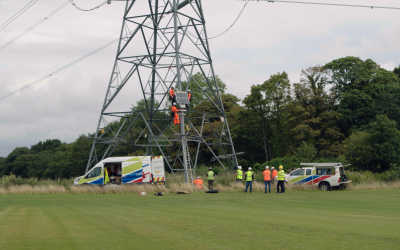Warm weather necesitates snow tranport for 2010 Games
The potentially un-white Olympic games serves as a symbol for unwanted and far-reaching consequences of climate change.

 While the word 'green' and 'Winter Olympics' are normally not seen in the same sentence, climate change has inspired a movement that aims to reach a carbon-neutral Olympic games.
While the word 'green' and 'Winter Olympics' are normally not seen in the same sentence, climate change has inspired a movement that aims to reach a carbon-neutral Olympic games.
The necessity becomes all-to-apparent, as a lack of snowfall forces the Canadians to use trucks and helicopters to tranport large amounts of snow from higher mountain peaks and place it on slopes of Mount Cyprus during a winter so warm that even the snow machines cannot function.
The Winter Olympic games are set to begin this Saturday, 13 February without its trademark: snow.
The snow-transport manoeuvre has become inconvenient, costly and time-consuming.
At the same time, potentially un-white Olympic games serves as a symbol for unwanted consequences of climate change, and will factor as another driving force to bolster awareness.
Say what you want, but many would miss skiing far more than polar bears.
With the coverage that the Olympics inherently provide, companies have pounced on the opportunity to demonstrate their ability to be environmentally friendly.
And, while no specific weather event measures can measure climate change, the lack of snow is symbolic of the way our planet is changing, and climate change will lead to more weather extremes. Companies have taken notice and used the olympics to vocalise their commitment to fight climate change.
Coca-cola has pledged to be "carbon neutral" and "waste-free."
The company plans to transport beverages on hybrid-vehicles and place recycle bins throughout the Olympic village. In addition, the Canadian government built innovative greener buildings to support the Olympic games along the lines of the Unites States' LEED standards.
After the games, the buildings will serve the community for recreation, day-care facilities, and housing. The Canadian government hopes to generate much of the required power for the games by trapping methane gasses from a nearby landfill.
This is a laudable investment in future sustainability for Vancouver and demonstrates an example of how both private and government sectors can work together and independently to better the planet. Since 1994, the Olympic committee has pledged to make environmental awareness a cornerstone of Olympic planning.
For the most part, the Olympics have seen progressively improved results, with this year's 2010 Winter Olympics judged the most progressive and environmentally aware Winter games to date.
Author: Michael Good | Climate Action
Images Provided By: Michael Sheltgen | Wikipedia






